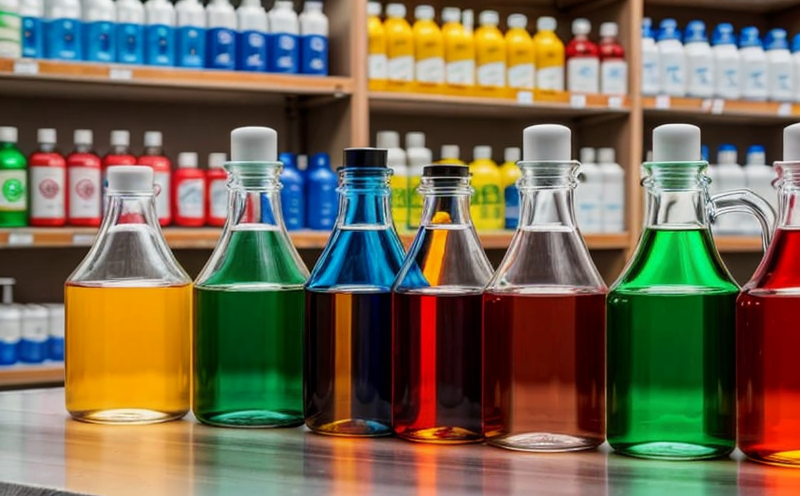Analysis of PFCs in water repellent textile finishes
The analysis of perfluorinated compounds (PFCs) in water-repellent textile finishes is a critical process that ensures the safety and compliance with environmental regulations. Perfluorinated compounds are widely used in textiles for their exceptional water, oil, and grease resistance properties. However, these chemicals pose significant health and environmental risks when released into the environment.
Our laboratory specializes in providing accurate and reliable analysis of PFCs in textile finishes to help manufacturers ensure compliance with international standards such as ISO 17025 and EPA guidelines. The testing process involves several key steps: sample preparation, extraction, purification, detection using advanced analytical instrumentation like liquid chromatography coupled with tandem mass spectrometry (LC-MS/MS), and data interpretation.
Sample preparation is crucial to ensure that the results are accurate and representative of real-world conditions. This includes washing the textile samples according to standardized procedures specified in ISO standards such as ISO 13284 for water repellent finishes. Extraction methods vary depending on the type of finish, but typically involve using solvents like methanol or acetonitrile.
Once extracted, the sample is purified further to remove any interfering substances that could affect the detection sensitivity and selectivity of PFCs. Purification steps might include solid-phase extraction cartridges designed specifically for removing impurities from aqueous solutions.
The final step involves detecting the presence of PFCs using LC-MS/MS, which offers high specificity and sensitivity required for measuring trace amounts of these compounds in textile finishes. Detection limits are typically below parts per billion (ppb), making this method suitable even when dealing with very small concentrations present on textiles.
Our team follows strict quality control measures throughout each stage of the process to ensure reliable results that meet international standards. This includes using certified reference materials, performing regular calibration checks, and adhering strictly to Good Laboratory Practices (GLP).
The importance of this analysis cannot be overstated given increasing consumer awareness about environmental issues related to chemical usage in everyday products. By conducting thorough testing at every stage of production, manufacturers can mitigate risks associated with PFC exposure while maintaining product performance.
Industry Applications
- Aerospace textiles that need exceptional water repellency without compromising on strength or comfort,
- Medical apparel designed for use in high-risk environments where contamination must be minimized,
- Clothing intended for outdoor activities such as hiking, camping, or mountaineering which requires durability against harsh weather conditions.
In these sectors, ensuring the safety of PFCs used in finishes is paramount. Compliance with regulations not only protects public health but also enhances brand reputation by demonstrating commitment to responsible manufacturing practices.
Eurolab Advantages
At Eurolab, we pride ourselves on delivering unparalleled expertise and precision when it comes to analyzing PFCs in water-repellent textile finishes. Our team comprises highly skilled scientists with extensive experience in this field who stay updated with the latest developments in analytical techniques.
We offer several advantages over other laboratories:
- State-of-the-art equipment that guarantees accurate results every time,
- Absolutely confidential handling of samples and data to protect client privacy,
- Short turnaround times for faster decision-making processes,
- Prompt communication ensuring clients receive timely updates on their analyses.
By choosing Eurolab, you gain access to a comprehensive suite of services tailored specifically towards meeting your unique needs. Whether it’s regulatory compliance or quality assurance, our goal is always to provide the most effective solutions possible.
Competitive Advantage and Market Impact
The ability to accurately analyze PFCs in water-repellent textile finishes gives manufacturers a competitive edge by allowing them to stay ahead of regulatory changes and market trends. It enables companies to make informed decisions regarding the use of chemicals in their products, thereby reducing potential risks associated with non-compliance.
Moreover, this capability helps businesses build strong relationships with customers who value sustainability and ethical production methods. Consumers today are increasingly concerned about where their clothes come from and how they were made. By demonstrating a commitment to responsible manufacturing practices through rigorous testing procedures like those offered by Eurolab, companies can enhance customer trust and loyalty.
Furthermore, compliance with international standards such as ISO 17025 ensures that our services are recognized globally, opening up opportunities for expansion into new markets where similar requirements exist. This not only broadens the reach of a company but also establishes it as an industry leader in terms of quality assurance and environmental responsibility.





